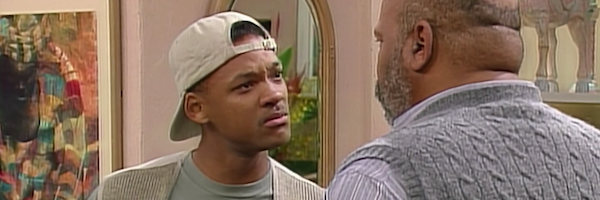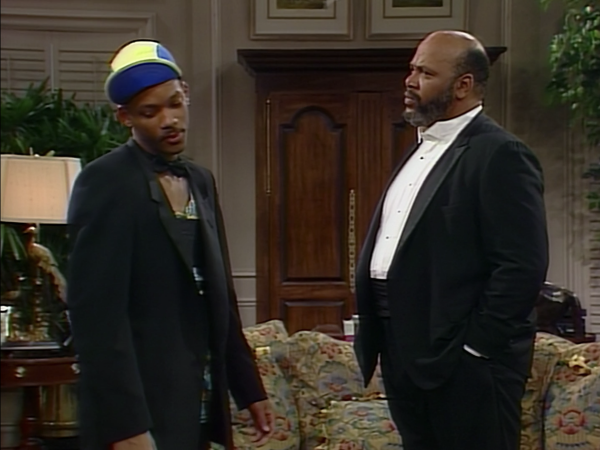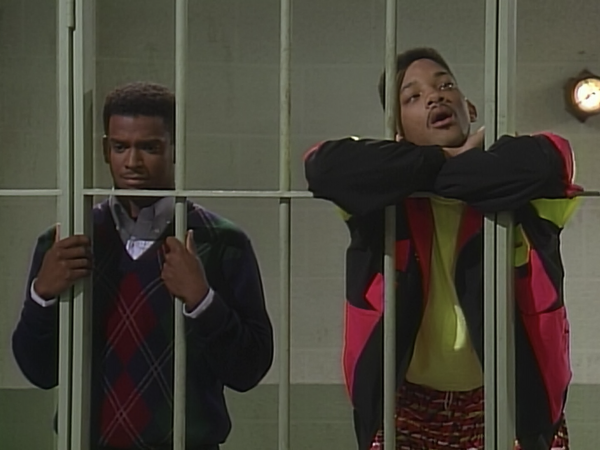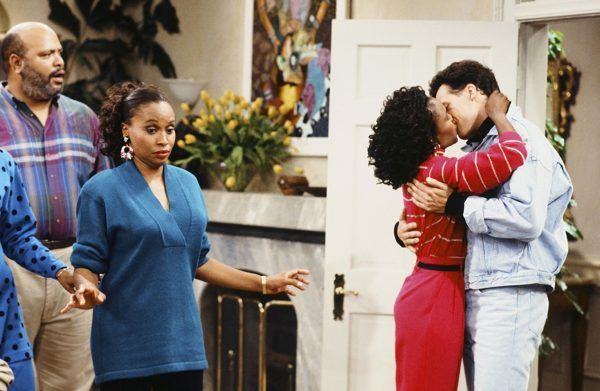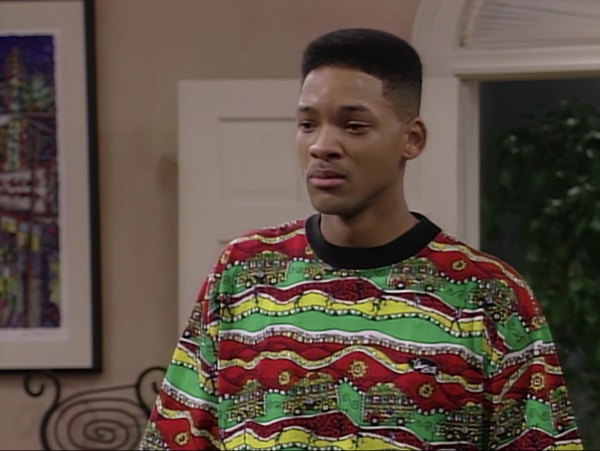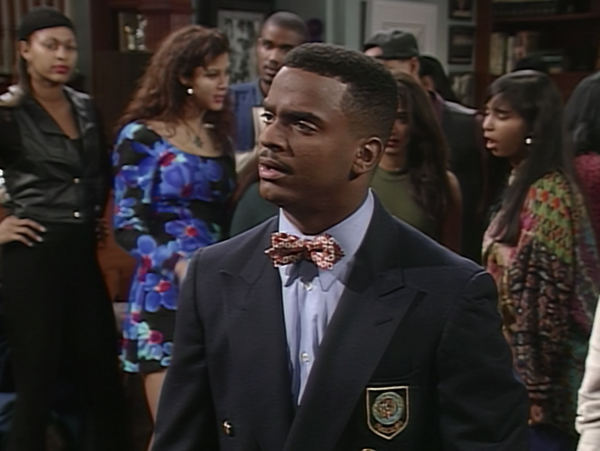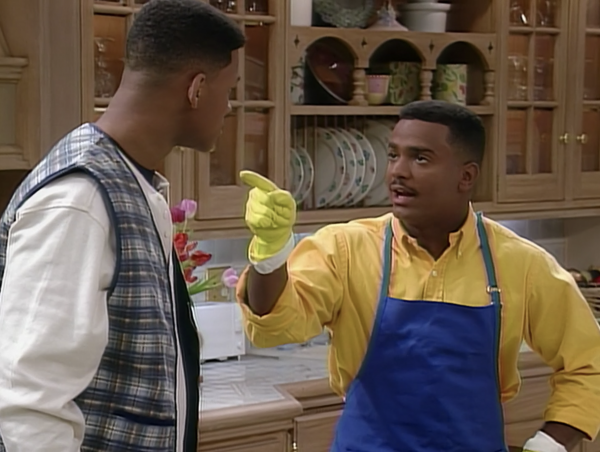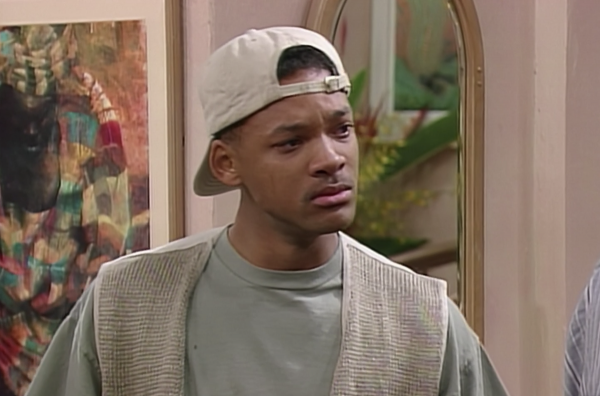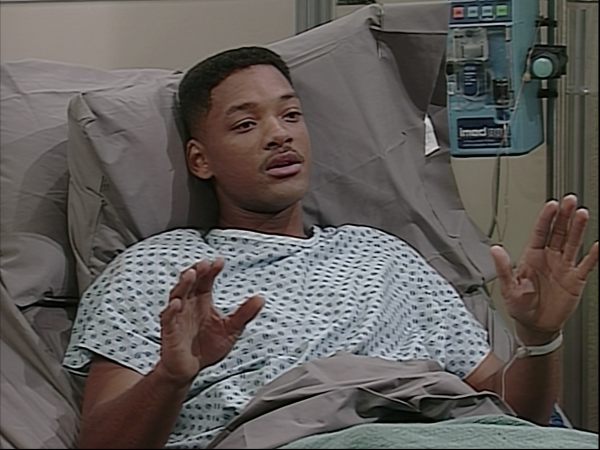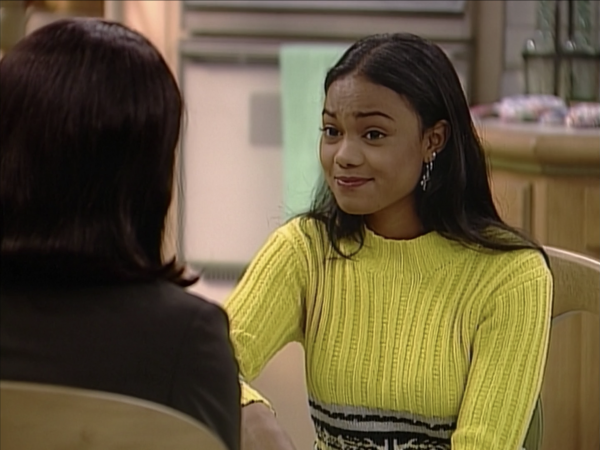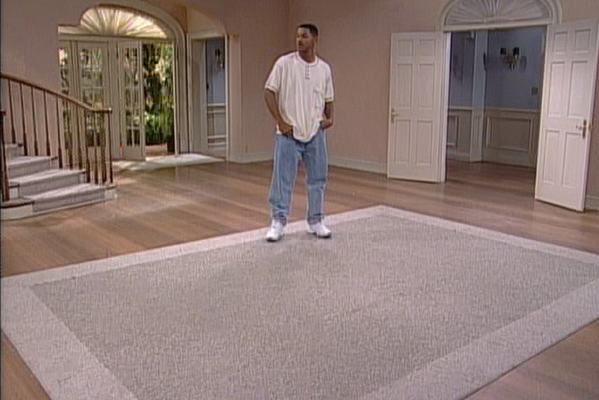The Fresh Prince of Bel-Air was, and continues to be, a breath of fresh air. Originally airing from 1990 to 1996 for six seasons, the sitcom broke Will Smith through to superstardom in a series of episodes articulating his transition from life on the mean streets of West Philadelphia to life in the palatial mansions of Bel-Air (hmm, if only there was a catchy summary of this inciting incident). Smith, playing a version of himself, lives with his extended family, and everyone lives, learns, laughs, loves, and grows with each other.
It's a special series to me, and to so many folks. In celebration of its 30th anniversary (the pilot aired September 10, 1990), I wondered why this show continues to play so wonderfully and warmly where so many other '90s sitcoms become forgotten. I believe it's because of the show's big, beating, sincere, courageous heart. The Fresh Prince is unbelievably silly, no doubt, with its oft-arch performances and willingness to surreally break the fourth wall ("How come we can't afford ceilings?" Will says in one episode, while the camera tilts up to literally show the studio lights). But these are all catchy seasonings to a fundamentally kind, responsible, and curious main dish. And when it digs into this core, it doesn't need silly jokes.
In honor of The Fresh Prince's 30th anniversary, here are the 10 best times the sitcom got serious throughout its run, in chronological order. Grab a hankie, whistle for a cab, and take a trip down memory lane with me. For more on The Fresh Prince, here's the latest intel on the upcoming reboot.
"The Fresh Prince Project" (Season 1, Episode 1)
Right from the jump, from episode 1, The Fresh Prince had more on its mind than its aesthetics might initially hint. The theme, extended in this pilot, summarizes the "pauper to prince" narrative of Will's initial journey with catchy, goofy flavor, but it doesn't stop the inherent complexities of this initial narrative's center from being any less pertinent. Class and race issues are at the core of Will's journey from Philadelphia to Bel-Air, and after a series of fish-out-of-water shenanigans where Will's lower-class upbringing clashes with the Banks' upper-class upbringing during a dinner party, these tensions explode explicitly.
Will tells Uncle Phil (James Avery) that he, straight up, has forgotten where he came from. That he has no idea what life on the streets is like. And Uncle Phil, in the first of Avery's many perfect performances, sets him straight. Tells him he grew up on the streets of Baltimore. That he knew struggles and overcame them. That he heard Malcolm X, whom Will had deified earlier in the episode, speak in person. It's a stunning piece of performance that lays the groundwork for the series' deft juggling of silliness and sincerity perfectly. And, it lets Will have a "not what he seems" moment, too; when Uncle Phil leaves the room after this chat, he notices Will playing Beethoven on the piano. Both parties have lots to positively learn about each other.
"Mistaken Identity" (Season 1, Episode 6)
In 1990, when "Mistaken Identity" first aired on NBC, a gurgling of tensions and resentments between the Black community and the police, founded on an entire history's worth of subjugation and explicitly race-based violence, were churning nearly at a breaking point. (One year later, Rodney King's beating by police will spark a series of protests and clashes in Los Angeles.) But much of white America remained (remains?) ignorant of such targeted frissons. As such, "Mistaken Identity" served (serves?) as a startling wake-up call, albeit one couched in comfort, comedy, and familiar class dynamics.
When the police pull over Will and Carlton (Alfonso Ribeiro) in a borrowed Mercedes, on the way to a Palm Springs vacation with Uncle Phil and Aunt Viv (Janet Hubert-Whitten), Carlton, covered in the security blanket of his class, his rational thinking, and the fact that his father is a judge, assumes they will explain what's going on and drive away no harm done. Will knows the truth, however — that these cops will take any chance they can get to subjugate two young Black men, especially given that they're driving a "stolen car." The duo gets arrested and put in jail, alongside an operatic singing convict ("Any time you see a white guy in jail, you know he did something bad!" Will reminds us), and Carlton's pristine visions of fairness and equality (not to mention his wealth and status) are shattered in the face of abject racism.
By the time Phil and Viv show up to bail them out, and for Phil to deliver a typically fiery speech about what justice should look like in this country (delivered to a particularly weaselly-looking Hank Azaria), the damage is done. But his words, as Uncle Phil's so often do, ring passionate with promise, with ideals, and with familial love. The rest of the series includes commentary about Black relationships with the police (think DJ Jazzy Jeff instinctually putting his hands up when a bailiff asks him to swear to tell the truth in court), but here, it did so explicitly and explosively.
"Guess Who's Coming to Marry?" (Season 2, Episode 6)
Borrowing its title from Guess Who's Coming to Dinner, the 1967 film in which Katharine Houghton brings home fiancé Sidney Poitier to her white parents to examine interracial relationships in a lightly comedic purview, "Guess Who's Coming to Marry?" flips the racial dynamics, bringing home a white husband (an atypically suave Diedrich Bader) to upset the extended Banks family. Baker is the husband-to-be of Janice (Charlayne Woodard), who's set to be married in the Banks' spacious Bel-Air backyard — if Will's mother Viola (Verneé Watson-Johnson) doesn't blow a gasket first. The rest of the family may find this all surprising, and Uncle Phil may at first think Frank (Baker) is a valet (in one of the best-staged act outs I've seen in a TV comedy; not to mention its sneakily provocative racial flip). But Viola is ready to boycott the wedding, and forbid her son from going, too.
Is Viola's reaction mere prejudice, plainly spoken? Not quite. I love when classic multi-cam sitcoms feel like excuses to put classic theater on television for the masses, and this episode has a wondrous scene that vaults into this hallowed ground. On the eve of Janice's wedding, a group of Banks women gather in the kitchen, unable to sleep, to snack on wedding treats and chat. It's a brilliantly played scene, rife with warmth and gentility even as they discuss tricky stuff. And then, Viola enters. The entire temperature of the room shifts. And finally, just like any great play, she tells her sister Janice what's really going on. She expresses her worries for Janice "as an African-American woman" for whom life has already stacked the deck against. "I did not make the rules, but I do know how to play the game. For survival, please don’t marry this man."
It's a shocking, plainspoken admission of society's privilege, one that gives the character tons of empathy and understanding. And, thankfully, I don't think it's any big spoiler to reveal that Viola does come around and attend the wedding after all — thanks to a wonderful speech delivered by Will to his mother, a representation of the hope of future generations changing established patterns and prejudices for the better. You will cry at the acapella song the family sings over the credits.
"Just Say Yo" (Season 3, Episode 19)
It's tricky to reckon with "Just Say Yo" with modern eyes. The trend of very special anti-drug family sitcom episodes was inspired explicitly by Nancy Reagan, to the point where she literally appeared in an episode of Diff'rent Strokes to deliver her anti-drug screed, and the relationship between the Reagan administration, drugs, and the Black community is a vile one to study (making the interpolation of "Just Say No" as "Just Say Yo" feel particularly gross). Plus, the specific choice of drugs — amphetamines — and the specific effects we see — Carlton dancing himself into a frenzy — unfortunately brings to mind other campy very special episodes, particularly the infamous Saved by the Bell caffeine pills debacle.
And yet. Will Smith is, like, such a good actor. So when he has to break down and confess to the family that the amphetamines Carlton found were meant for him, making him tacitly responsible for Carlton's hospitalization, he commits to it beautifully. He uses his emotions like an instrument, starting as strong as he can, until it can't help but fracture and fall. Wisely, his apology tends to stay out of the socioeconomic implications of drugs, and more into the personal point of view of "I am a member of this family who has hurt another member of this family." It's purely powerful stuff, the kind of moment that immediately casts the rest of the episode in a better glow. I remember some David Mamet quote that said it doesn't matter how good an actor is; if the script is good, the final product is good. This episode, and especially this scene, tends to prove Mr. Mamet wrong.
"Blood Is Thicker Than Mud" (Season 4, Episode 8)
Carlton is confidently, uniquely himself. He loves dancing, especially to Tom Jones and the Sugarhill Gang. He's fond of structure, of status, of systems. He's joyful, performative, and cares not what others think about him. All of these qualities make him one of our great television characters; all of these qualities make him rife for roasts from his cousin Will; all of these qualities add to the interesting playing with and subverting of what kinds of racial depictions we saw on television in the early '90s. And, all of these qualities are challenged directly in "Blood Is Thicker Than Mud," a standout episode for Alfonso Ribeiro.
By Season 4 of The Fresh Prince, Will and Carlton have graduated from high school and are now beginning their college studies. Thus, the hunt for a fraternity is on, and the two decide to attend a rush event for a Black frat on campus, run by Top Dog (Glenn Plummer). Will, as he is wont to do, acts a fool; and Carlton, as he is wont to do, hops over every task with a double front-flip, cleaning up the joint while he's at it. When the time has come for Top Dog to choose his new candidate, Carlton assumes he'll get picked, and Will's foolishness will not be tolerated. But Top Dog makes the opposite decision, deciding that WIll is more "authentically Black," calling Carlton a "sellout."
Carlton's response comes not as a surprise, but as a well-practiced speech, something he's been having to reckon with his entire life. He eradicates the box of one proper Black identity not with force, but with precision. "Being Black isn't what I'm trying to be, it's what I am," says Carlton, plainly, making sure Top Dog knows he's the real sellout before leaving. And Will, in one of the all-time tension diffusers, hypes up his cousin's speech with bravado. This moment feels good to watch, and feels like a cathartic piece of permission for Black folks who don't fit the typical mold you see on television to be exactly who they are, and be comfortable in that.
"Home Is Where the Heart Attack Is" (Season 4, Episode 10)
Regrettably, The Fresh Prince of Bel-Air is full of fat-shaming jokes, particularly from Will toward Uncle Phil (and in one entire episode, they bring on royal guest star Queen Latifah just to have her be a learning moment that overweight people have feelings too; Latifah and Smith sell the material, of course, but there's definitely a lack of depth in the exploration, which I guess means Mamet was right). But this constant poking at Uncle Phil's weight comes to a serious head in "Home Is Where the Heart Attack Is," an episode that, as you might guess, gives Uncle Phil a weight-induced heart attack to suffer through. The most effective and illuminating emotional reaction to this doesn't orient around Will, however — at least not directly.
It's Carlton, Phil's son, whom we see suffer this trauma the most severely, even more so than Phil himself. Those qualities I assigned Carlton regarding the previous episode? Those qualities are all self-weaponized, manifesting in self-destructive ways. Carlton refuses to see his father after this moment of vulnerability and mortality. Instead, he laser-focuses on cleaning the house, taking care of everything except himself, feeling genuinely, scarily haunted. Will then, becoming a touch of a father figure himself, must set his cousin straight. Will's father is out of the picture; Uncle Phil is by all accounts the closest to a dad he has. But Carlton is actually, literally Phil's son. This relationship needs to be attended to, now. And when Carlton does buck up and speak to his father, vulnerability and everything, it's simply stunning television.
Speaking of "Will's father is out of the picture..."
"Papa’s Got a Brand New Excuse" (Season 4, Episode 24)
This remains, by my estimation, the single greatest example of a television sitcom getting real — and I wouldn't be surprised if it continues to be for the rest of the medium's history (gritty reboots be damned). After more than a decade of being absent from his life, Will's father Lou (Ben Vereen) returns, eager to spend time with his son Will here in the fancy hills of Bel-Air. Will is thrilled at this news, ready to rekindle his paternal relationship without much skepticism apparent. Uncle Phil, however, is worried that Will's father will simply disappoint Will again...
...and disappoint Will he does. It's a scene even the most casual of Fresh Prince fans have committed to memory, effectively staged and played without a studio audience to give us any emotional relief. Lou is, indeed, going to walk out of Will's life again, having scammed the Banks family for what he needs. He tries to make the exit without Will noticing, but Will does. That childlike sense of rage, coupled with his newfound maturity, rises into his throat; his final act of defiance is to refuse to call his father "Dad," opting for his name instead.
This leaves Phil and Will alone, and leaves Will the opportunity to spill out all of his feelings about his absent father. Revealing that he bought Lou a present — a sculpture of a father holding his son — he insists that he's made it through his entire life, and all of his formative moments, without his dad, and that he'll just keep going. But then, in an all-time line reading, Will simply asks his uncle, "How come he don't want me, man?" The two collapse into an embrace. The shot frames this moment alongside the sculpture; subtly, but decidedly, communicating that this is the real father-son relationship at the center of Fresh Prince, at the center of Will's life.
"Bullets Over Bel-Air" (Season 5, Episode 15)
When Will and Carlton are held up at gunpoint at an ATM, a shot is fired, and Will is the victim. Will makes it to the hospital, and even has a laissez-faire gallows sense of humor about the whole ordeal. After all, given his upbringing, getting threatened by folks packing guns is an unfortunately common part of life.
Carlton, however, self-weaponizes and assumes too much responsibility again, and his faith in an inherent sense of decency in the systems of life is shattered again. He resorts to buying a gun himself, ostensibly for protection. But as he reveals to Will in a tense, hospital-set two-hander finale (staged this time, curiously, with a studio audience), he hopes deep down inside that he can meet the man who shot Will, and get his revenge. Ribeiro plays this sequence like a man on a precipice, a fork in the road for Carlton, a thrillingly unpredictable piece of theater that even speaks to that common theater rule involving guns on stage.
And Will sets him straight. Smith rarely resorts to out-and-out anger in his Fresh Prince performances, but we see it here, and it is warranted. He rages at his cousin about the futility of violence and revenge. Insists that if Carlton goes through with this plan, he's just as bad as the guy who put Will in the hospital. And insists that Carlton leaves the gun behind immediately. Beyond its visceral, gut-punching thrills as a theatrical sequence, this moment is a stark reminder to Carlton, and to everyone watching: We can lose faith in systems that resort to violence, rightly so. But it means, more than ever, we can't lose faith in people.
"Not with My Cousin You Don't" (Season 6, Episode 7)
Young Ashley Banks (Tatyana Ali) is growing up. And she thinks she might be ready to enter a sexual relationship with a partner (Jaleel White, of course), despite their relationship being inherently long distance. We see this formative piece of growing up reacted to in two different ways — a very problematic one, that happens to be driven by two leading men; and an incredibly sensitive, sincere, and real one, that happens to be driven by two leading women.
Much of "Not with My Cousin You Don't," as you might guess by the title, is predicated on icky gender-role shenanigans. Will and Carlton are determined to stop their female family member from having sex, using intercoms and interrogation tactics as devices to get in the way, to claim ownership over Ashley's body, to inherently view a young woman's sexual exploration as robbing her of her "purity." It kinda stinks, is what I'm saying, even when these two male knuckleheads eventually learn their lesson.
But smack-dab in the middle of this episode lies a beautiful one-on-one conversation, one of the best ever produced during Fresh Prince's run. Ashley speaks with her sister, the oft-materialistic and flighty Hilary (Karyn Parsons), to ask her, directly, when she knew she was ready for sex. Hilary's response is just a wonderfully stated, expertly performed piece of sisterly advice and love, undercut appropriately by in-character jokes (Parsons knows this character like a craftsman knows their tool). Ashley asks her if she was nervous, and Hilary responds that she absolutely was, but she "was ready." Then, she gives Ashley the agency and compassion he needs to make this decision moving forward: "Only you'll know when the time's right for you." A powerful, teachable, simple lesson.
"I, Done" (Season 6, Episodes 23 and 24)
Sometimes, to end an sitcom, you need the main character of your sitcom to look around a now-empty set for the last time, turn off the lights, and leave. It's a simple trick, perhaps best-known in the final moments of Cheers. But The Fresh Prince might be the most successful because of what it implies about the future of its characters, and how neatly it closes the arc for Will.
All of the Banks are planning on leaving their palatial Bel-Air estate, which we've gotten to know and love over six seasons. Hilary and Ashley are heading to New York, Carlton is heading to Princeton, and Phil and Viv (and Nicky; remember Nicky?) are heading to New England themselves to be closer to their family. Where does that leave Will? Did he actually accomplish anything during this time living with his upper-class relatives? Has this period, reactionary and transitory in intention, ended with an anticlimactic ellipses rather than an emphatic exclamation?
In fact, the issue with this point of view comes with calling his time a transition in the first place. Uncle Phil helps his nephew find a new California apartment on his own, and he'll continue his collegiate studies in the state, too. He might be leaving this Bel-Air home for good, but this is still the first half of his new life, his new identity. Will has grown and learned immeasurably from his new circumstances and familial compassions, and these growths came so organically that he didn't even notice them happening. He's now his own person, living in his new life, that he himself built this whole time. Now that the building is done, he gets to live in it. And to do so, he has to leave the building one final time.

